Estimated reading time: 8 minutes
Chickens will attempt to eat just about anything they find – even foods that are not good for them. Since chickens are omnivores, there are few foods that chicks, hens, and roosters will find enticing … including plants in your garden.
When allowed to free-range and forage for their own food, chickens can naturally supplement their diet with high-protein bugs and reduce the cost to feed them. Chickens are not picky eaters, they can rapidly consume the “good bugs” that you want living among your crops, herbs, and ornamental flowers, as well.
Due to their smaller stature and bill type, chickens cannot consume backyard invaders like small snakes and frogs the way a duck can – but that will not keep a rowdy rooster or determined hen from trying.
Because chickens are not selective eaters, it is imperative that you make sure anything growing in their environment is not harmful to them. Just like kids with ice cream and candy bars, chickens will gorge on foods that are not dangerous to them, but it will still be an unhealthy dining option.
Want to save this post for later? Click Here to Pin It On Pinterest!
Can You Overfeed Chickens?
Mature chickens consume roughly ¼ of a pound of feed daily – or one and a half pounds of feed per week. It is possible to overfeed a chicken, especially with grain, treats, or table scraps. Controlled and even slow growth is often best for both breeders and meat birds.
What You Can Feed Your Chickens?
When you search online for a list of foods chickens can eat, it is not unusual to find conflicting information. Searching for the best way to care for your livestock or pets should neither be confusing nor frustrating – but that is often what happens when writers crank out information they have based upon online searches instead of real-world experience.
All of the foods chicken can and can’t eat on this list are a result of years of experience keeping chickens on our homestead.
Safe Chicken Treats
- Apple Slices
- Basil
- Bell Peppers
- Blackberries
- Blueberries
- Brewer’s Yeast – sprinkled on the feed
- Broccoli
- Brussels Sprouts
- Cabbage
- Calendula
- Cantaloupe
- Carrots
- Cauliflower
- Cereal – only serve types without added sugar, like plan Cheerios
- Chamomile
- Cheese – in moderation and not a frequent treat
- Cherries – not pits
- Cilantro
- Cooked asparagus
- Cooked beans – not a frequent treat
- Cooked chicken
- Cooked pasta
- Cooked rice
- Cooked seafood
- Cooked turkey
- Corn – chickens love corn on the cob or corn frozen in water as a summer beat the heat treat
- Cottage Cheese – in moderation and not a frequent treat
- Cucumbers
- Daisies
- Daylilies
- Echinacea
- Eggshells – feed chickens back their eggshells in the winter to boost their calcium intake
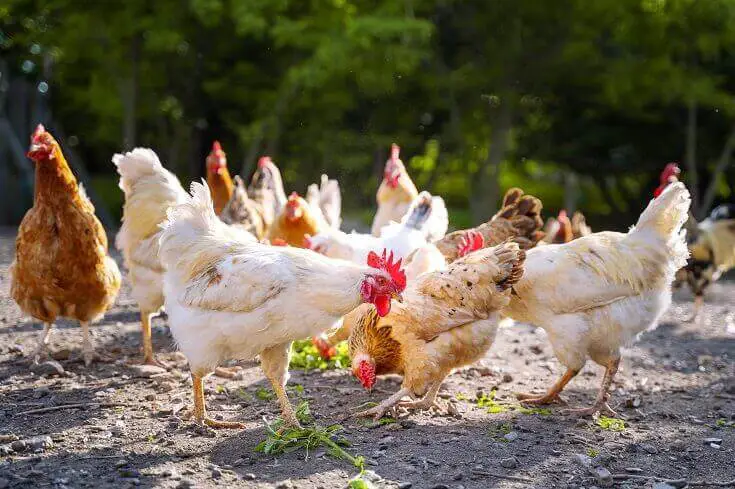
- Ferns
- Grapes
- Hard-boiled eggs
- Hostas
- Kale
- Lavender
- Lettuce
- Mealworms
- Millet
- Oatmeal – raw or cooked
- Oats
- Oregano
- Parsley
- Peaches – not pits
- Pears
- Peas
- Peeled Bananas
- Pineapple Chunks
- Plain Yogurt – in moderation and not a frequent treat
- Pumpkin
- Raisins
- Roses
- Sage
- Spinach
- Squash
- Strawberries
- Summer Savory
- Sunflower Seeds
- Sweet Potatoes – cooked and without the peels
- Swiss Chard
- Thyme
- Turnips – preferably cooked
- Unbuttered Unsalted Popcorn
- Watermelon
- Zucchini
Bread
Ok folks, this is typically the most hotly debated treat on any list of foods chickens can and can’t eat. I do give my chickens (and ducks) bread. I especially use it as a free-range training treat so the chickens learn quickly what to do at “put up” time.
In my personal experience, a few bits of bread once a day or as a weekly treat is safe. I never give the birds any bread until after they have eaten their feed ration for the day. I favor using wheat bread because it is far healthier than white bread for both critters and humans.
I make herb balls for my flock once a month (twice a month in the winter) by mushing bread into a ball shape and then coating it with beneficial herbs like: cinnamon, oregano, basil, sage, thyme, and turmeric to help boost their immune systems.
In fact, I even give the balls in a smaller version to chicks so that I can opt out of using medicated feed – this is a personal choice that has worked well for me, your experience may vary.
Free Range Natural Treats
If your flock is free-range or you want to cultivate potted plants inside of your chicken coop run, consider the items on this natural treat list.
Setting up a compost pile right inside of your chicken coop run will give you the ideal place to throw all of your vegetable peels, garden waste, and table food scraps that are safe for the chickens to eat.
The chickens scratching and walking on the compost pile will effectively “turn” it and their droppings will add nutrients into the soil you are cultivating.
- Herbs
- Insects
- Sunflowers
- Tadpoles
- Weeds – especially purslane, jewelweed, broadleaf plantain, and mullein
- Wild Berries
- Worms – of all types
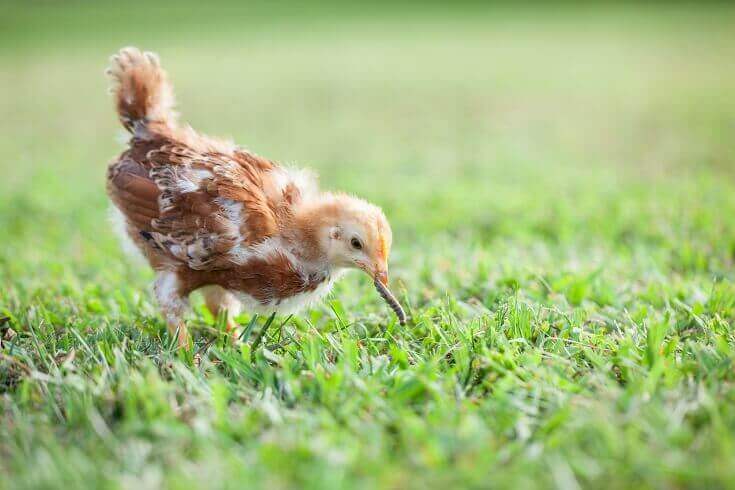
Foods Chickens Can’t Eat
- Avocado – Never feed chickens the flesh of the fruit, pits, or even the skins. Avocados are toxic to nearly all birds and often cause myocardial necrosis.
- Caffeine – Coffee, soda pop, and even teas that are healthy to humans. Caffeine is a methylxanthine and is harmful to chickens and other livestock.
- Chocolate – It contains Theobromine, which is toxic to poultry birds and most other livestock and pets.
- Citrus Fruit – Some folks also do this in small amounts, but it is not recommended – and is especially bad for ducks if you keep them with your chickens. Providing a few citrus fruit peels is a better choice if you feel compelled to give citrus fruit to your chickens – which I consider a poor idea.
- Dairy – Yes, there are dairy products on the foods chicken can eat list but they are to be given only as infrequent treats. Dairy is yet another controversial chicken treat. If given, it must be in small amounts and only in great moderation because a chicken’s digestive system does not properly digest milk sugars. Consumption of dairy on a regular basis or in large amounts infrequently can cause scours – to the point of diarrhea – which causes dehydrating and can be deadly. I allow a little dairy to sneak into otherwise safe table scraps only once or twice a year.
- Eggplant – It also contains Solanine and is a member of the nightshade family, as well.
- Moldy Food – This type of food can often harm wing growth, cause deformities in chicks, and cause aspergillosis, a possibly fatal lung infection.
- Onions – While the skins are both safe and healthy to eat, onions themselves contain thiosulphate. This compound can cause jaundice in hens, a potentially fatal anemia, or kill healthy red blood cells.
- Potatoes – Except sweet potatoes without their peels. Some folks give fresh potato peels to their chicks and this may be pretty safe, as long as the peels are not green.
- Red Meat – Some folks do this in small amounts without a problem, but it is not recommended.
- Rhubarb – Consuming rhubarb can (often) cause thin eggshells. Raw rhubarb leaves contain oxalic acid – a toxin.
- Salty Foods – Candy, chips, salted peanuts, junk food in general.
- Tomatoes – This is also a hotly debated chicken treat. Although tomatoes (ripe only) are more accepted as a chicken treat now than they used to be, I still do not give them to my poultry birds. The Solanine in tomatoes that are not 100 percent ripe can kill healthy red blood cells in poultry birds and cause scours or even heart failure depending upon the consumption amount.
When deciding what foods to give chickens and how often to provide them, please remember that even the healthiest of treats should never exceed more than 10 percent of the bird’s daily diet.
Only introduce one new treat every week or so to provide enough time to determine if any of the birds have an allergic or toxic reaction to the treat. Allergic reactions do not necessarily happen immediately, and they might not be visible until you find a dead chicken in the coop. When chicks or new mature hens or roosters are melded into the flock, they too will need the time to safely acclimate to your treat routine.
Typical symptoms of an allergic reaction in a chicken include scours, lack of appetite, lethargy, inability to fly or lift wings properly, convulsions, kidney failure, rapid heartbeat, visceral gout, reduced quality or quantity of egg-laying, and bubbles coming from nostrils.
It is best to not give chicks any treats until they are at least one month old to give their young digestive systems time to develop properly. Chickens are smart enough to avoid consuming items in nature that are bad for them, but not always.
Be mindful of the natural and cultivated plants, weeds, and herbs that chickens can come into contact with. Review your free-ranging area seasonally to get a better idea of what is growing or residing there before turning your flock loose to forage.
Like this post? Don't Forget to Pin It On Pinterest!



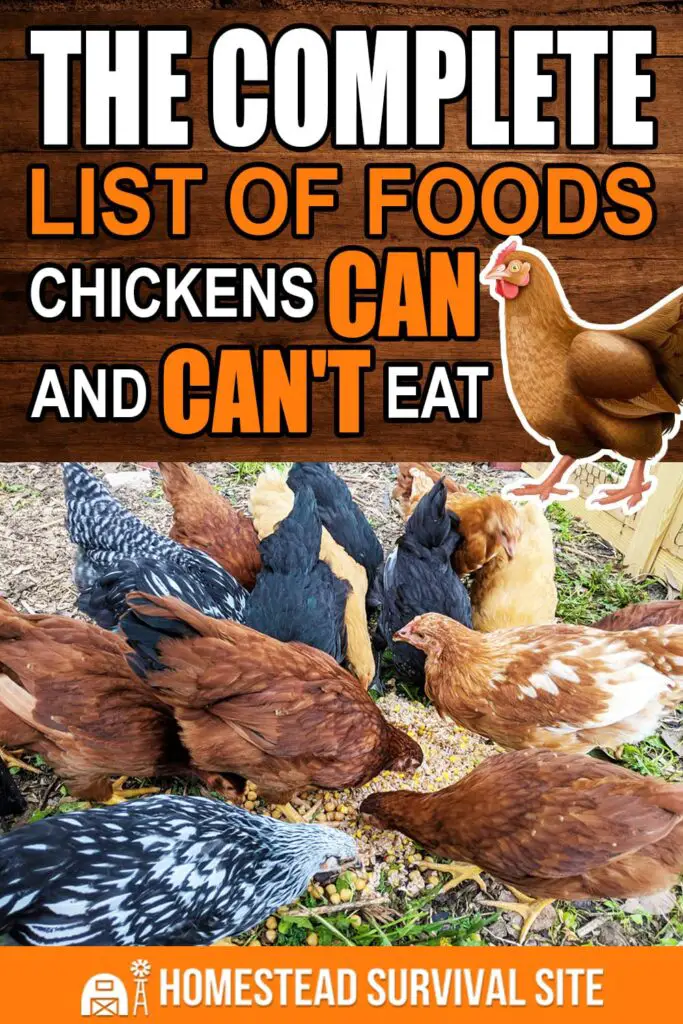


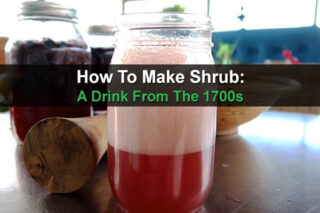

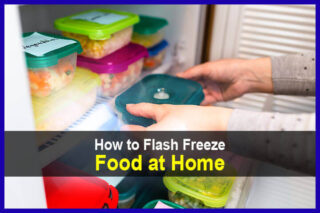

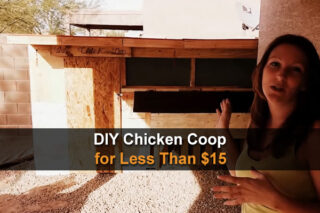
I would love this list in a printer friendly form to keep on the refrigerator for my husbands reference lol.
There’s a print button next to the share buttons. It will generate a printer-friendly version for you.
There’s a print button next to the share buttons. It’ll generate a printer-friendly version for you.
Thank you for all your tips on chickens etc